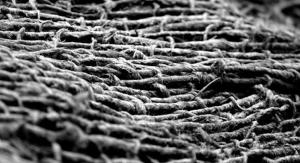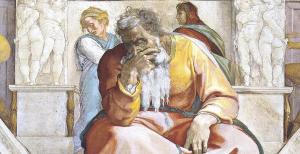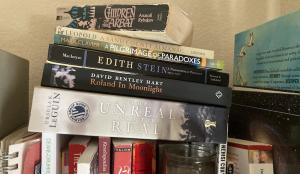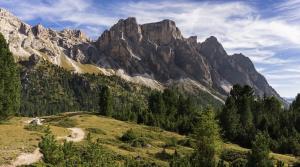
Why does God give us language? That may not be a question you’ve ever wondered about, or thought of wondering about. The “point” of language seems obvious enough. It’s how we get by. It turns needs into acquisitions, isolation into community. And not just for humans. We’re discovering the complex ways plants and animals use language, with audible, visual, and subtle forms of messaging. Language is a survival adaptation.
The Gift of Language
But what if we assumed that words themselves were one of the most basic gifts God gives us? This is in fact a key assumption of the ancient Greek theologians, and I’ve written about it before. A world created through Logos, divine language, is itself made up of logoi: speaking, wording. A day is a calling, as Psalm 19 says. So is everything God made: I am a walking, talking bit of divine expression.
And now I’m wondering about a further gift: it’s not just that God’s language is what makes us what we are. God gives us language so we can continue being what we are. The bristling hairs, wagging tail, and big chesty bark makes my dog what he is.
So I want to think about why we humans in particular received that gift. What was God hoping for, when God gave us language?
Rowan Williams on Faith and Words
In a recent collection of plays, Rowan Williams explores this question. How does language help us not only craft a life, but craft a life of faith? It’s the sort of thing he’s considered before, especially in his 2013 Gifford Lectures. Here he lets his imagination delve into the question by putting fictionalized characters in conversation with one another. Fictionalized, if not fictional: the three plays center on, in turn, young William Shakespeare, poet David Jones, and the raising of Lazarus. I’ll leave the others for another time, and reflect on the second.
The play about David Jones lets us listen to a poet who is trying hard to make sense of what seems, for all the world, senseless. Jones was a survivor of the first World War, wounded in one of the British army’s ugliest battles. After the war, he made his way to the community of priests and artists around Eric Gill, an artist and philosopher. Gill had a vision of an anti-capitalist micro economy, where like-minded priests, laypersons, and artists would live together in the English countryside, fashioning a new model of life in community. Jones joins them, works on wood carvings, writes poetry, and falls in love with Gill’s daughter Petra.
The Language Net
Gill, in Williams’s play, never really understands the strange and obscure art Jones is working at. Images engraved in wood with wildly criss-crossing lines, often with words threaded through. In one scene, Jones attempts to explain. It’s like if you’d write a letter, and then “you’d write across what you’d written as if you were weaving, making a net, a —what, a web, something tight enough to hold all the—all the debris, all the dropped things and people waiting to hear their real names being called, waiting to be taken to some sort of home.”
You may need to read that again. I did. Several times. Jones speaks, in Williams’s play, as a man damaged by war. He has trouble finishing thoughts. He’s chronically unsure of himself. He’s terrified of crowds and teapots. Here he’s saying something remarkable, though it comes out in pieces, like bits of shrapnel lodged in a wound.
In his art and his poetry, he’s trying to weave a net that catches all the dropped things. Perhaps even dropped people, if that’s what he means to say. Something that can hold our “real names.” Can words weave themselves together like that? If we’ve lost part of ourselves in the mud and blood of battle, can language catch what we’ve lost? Can it remake or rename us?
So Many Dropped Things
The play takes us into the darkest and ugliest aspect of this experimental community of artists. We now know that Gill, the community’s founder, sexually abused his two daughters. His daughter Petra’s dialogue in the play is always in some way about this trauma, while Gill himself uses language to avoid it.
Jones, absorbed in his own post-trauma, is largely unaware of his fiancé’s. She, like him, is a dropped thing, a person who has lost parts of herself and is trying desperately to recover them.
Jones fails, of course, to say all that he wants and needs to say. As does Petra. There’s too much left behind, like the rifle he left under an oak tree after he was wounded in battle. Or the wooden doll her father made her, which lies abandoned on the workshop floor. And this failure becomes for both of them its own kind of torture. But the point, as another character reminds David, was never to say everything. “Not always trying to say big things, just letting it show through.” The point is the net itself, the woven attempt to give our wounded selves and companions a place to fall.
God’s Language Net
As I ponder this difficult drama, I find myself returning to my curiosity about faith and language. The Word itself creates us, and becomes our life and our resurrection. This is the landscape Williams explores in the play about Lazarus. Here, in this gut punch of a play about geo-political and familial traumas of the previous century, the question is about our little words that get to share in the creating and recreating divine Word.
We can never say all the big things that we need to say. We can’t call the proper names of people in a way that says fully, finally, adequately who they are. Likely we can’t even put into words the hardest parts of our own journeys. But that’s no reason to give up on language. God’s Word is the woven net that catches it all. We —artists, poets, singers of silly songs, talkers of all sorts—get to do our weaving as a way of sharing in God’s grand poem of all things and all names. We get to “bear witness,” as Jones puts it.
That, I suppose, is why God gives us all these words.











